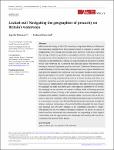Locked out? Navigating the geographies of precarity on Britain's waterways
| dc.contributor.author | Herman, A | |
| dc.contributor.author | Yarwood, R | |
| dc.date.accessioned | 2024-02-16T09:08:15Z | |
| dc.date.available | 2024-02-16T09:08:15Z | |
| dc.date.issued | 2024 | |
| dc.identifier.issn | 0020-2754 | |
| dc.identifier.issn | 1475-5661 | |
| dc.identifier.uri | https://pearl.plymouth.ac.uk/handle/10026.1/22056 | |
| dc.description.abstract |
Motivations for living on the UK's waterways range from lifestyle to financial, but increasing numbers have been pushed aboard in response to current, and longstanding, cost‐of‐living and housing crises. However, while more affordable than living on land, our qualitative investigation reveals a diversity of practices and experiences of marginalisation on the waterways, drawing out the impacts of temporal and spatial fluidity to inform our understanding of precarity in a mobile world. The waterways are a contested and politicised space with diverse actors seeking to delineate legitimate practices and users. Liveaboard boaters practice residential subjectivities in what others designate as leisure spaces. Resistance to such powerful claims to the waterways is not necessarily chosen or active and yet has become implicit to boaters' everyday practices. The mobility and liminality offered by boat living, experienced by some as a chosen freedom and others as a restrictive imposition, presents opportunities for resistance to powerful interests but also social marginalisation and stigmatisation. Through a focus on moorings, we highlight the legal and spatial grey areas regularly inhabited by all boaters. In seemingly secure marinas, we expose a hidden world of housing precarity with residential boaters' living in the shadows of these leisure‐designed spaces, resulting in no stability, security or statutory rights. For boaters out on the waterways, precarity continued, albeit with different manifestations. Powerful local actors mobilise narratives that disembed boaters from the waterways through the absence and poor maintenance of essential facilities alongside the loss of legal, safe mooring sites. Precarity emerges as not something restricted to ‘vulnerable groups’ but an ever present ontological condition. As such it is critical to understand how individuals and communities are responding to their implicit vulnerability, and the opportunities and challenges that mobility offers to the development and practice of this agency. | |
| dc.language | en | |
| dc.publisher | Wiley | |
| dc.subject | agency | |
| dc.subject | mobility | |
| dc.subject | precarity | |
| dc.subject | qualitative | |
| dc.subject | UK | |
| dc.subject | waterways | |
| dc.title | Locked out? Navigating the geographies of precarity on Britain's waterways | |
| dc.type | journal-article | |
| dc.type | Article | |
| dc.type | Early Access | |
| plymouth.publication-status | Published online | |
| plymouth.journal | Transactions of the Institute of British Geographers | |
| dc.identifier.doi | 10.1111/tran.12671 | |
| plymouth.organisational-group | |Plymouth | |
| plymouth.organisational-group | |Plymouth|Faculty of Science and Engineering | |
| plymouth.organisational-group | |Plymouth|Faculty of Science and Engineering|School of Geography, Earth and Environmental Sciences | |
| plymouth.organisational-group | |Plymouth|REF 2021 Researchers by UoA | |
| plymouth.organisational-group | |Plymouth|Users by role | |
| plymouth.organisational-group | |Plymouth|Users by role|Academics | |
| plymouth.organisational-group | |Plymouth|REF 2021 Researchers by UoA|UoA14 Geography and Environmental Studies | |
| plymouth.organisational-group | |Plymouth|Faculty of Science and Engineering|School of Geography, Earth and Environmental Sciences|SoGEES - Manual | |
| plymouth.organisational-group | |Plymouth|REF 2028 Researchers by UoA | |
| plymouth.organisational-group | |Plymouth|REF 2028 Researchers by UoA|UoA14 Geography and Environmental Studies | |
| dcterms.dateAccepted | 2024-01-02 | |
| dc.date.updated | 2024-02-16T09:08:15Z | |
| dc.rights.embargodate | 2024-2-17 | |
| dc.identifier.eissn | 1475-5661 | |
| dc.rights.embargoperiod | ||
| rioxxterms.versionofrecord | 10.1111/tran.12671 |


